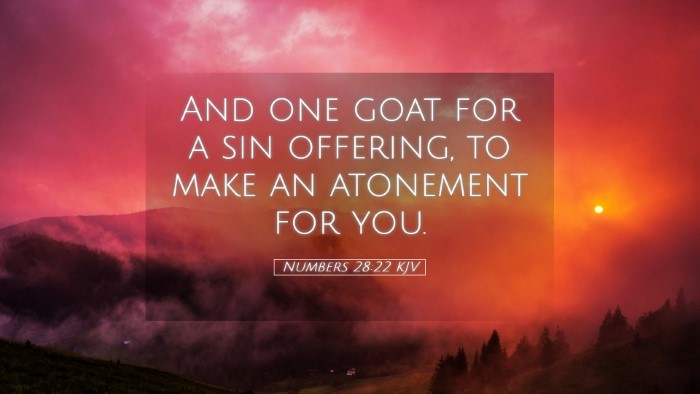Commentary on Numbers 28:22
Verse: "And on the tenth day of this seventh month ye shall have an holy convocation; ye shall afflict your souls: ye shall not do any work therein."
Introduction
The passage from Numbers 28:22 relates to specific ritual observances within the Israelite community, particularly focusing on the Day of Atonement, also known as Yom Kippur. This verse serves as a reminder of the sacredness of this observance and its significance in the overall framework of the Levitical law.
Contextual Background
This verse is situated within a broader section that details various offerings and feasts that the Israelites are to observe. Numbers 28 and 29 outline the regular and festival offerings commanded by God, emphasizing a pattern of worship centered around divine appointment.
Insights from Public Domain Commentaries
Matthew Henry's Commentary
Matthew Henry underscores the importance of the Day of Atonement, highlighting it as a day set apart for national repentance and collective spiritual renewal. He notes that the command to "afflict your souls" signifies a deep spiritual reflection, as the people were to recognize the gravity of their sins. Doing no work on this day further emphasizes its solemn nature, reflecting a complete focus on solemnity and self-examination.
Albert Barnes' Commentary
Albert Barnes elaborates on the significance of the term "holy convocation," which he interprets as a gathering for sacred purpose. He remarks that this gathering is not merely social but is imbued with divine authority, underscoring a communal aspect of worship. He explains that "afflicting your souls" involves abstaining from all pleasures, including food, as a means to express sorrow for sin and earnestness in seeking reconciliation with God.
Adam Clarke's Commentary
Adam Clarke adds a nuanced interpretation of the phrase "afflict your souls," suggesting that this involves both public acknowledgment of sin and a personal commitment to spiritual restoration. Clarke emphasizes that this observance serves as a foreshadowing of Christ's ultimate sacrifice, providing a lens through which one can view the entire sacrificial system as a precursor to redemptive history. He also stresses the lack of work on this day, associating it with the cessation of ordinary life to allow for spiritual engrossment.
Theological Implications
The theological significance embedded in Numbers 28:22 is profound. It highlights the necessity of atonement in the relationship between God and His people. The prescribed day serves as a critical reminder that God desires a contrite heart and a humble spirit as a prerequisite for forgiveness. It encapsulates the principles of repentance, communal worship, and divine grace, which remain central to Christian theology.
Reflection on Atonement
- Spiritual Preparation: The command to “afflict your souls” can be seen as a call to introspection, prompting believers to purify their hearts and minds.
- Community Engagement: The holy convocation serves as an invitation for collective acknowledgment of sin and mutual encouragement in faith.
- Shadows of Christ: The observances of the Old Testament prefigure the ultimate atonement fulfilled in Christ, enhancing the appreciation of the New Covenant.
Practical Applications
For pastors and church leaders, Numbers 28:22 provides foundational teaching on the importance of setting aside time for reflection, repentance, and communal worship. Here are some practical applications:
- Encouraging Congregational Repentance: Foster an environment where congregants feel safe to confess and turn from sin through corporate repentance.
- Designated Days of Reflection: Organize specific days within the church calendar dedicated to spiritual reflection and reconciling with God.
- Teaching on Holiness: Emphasize the significance of holiness and sacrificial living as models for the community, inspired by the observance of the Day of Atonement.
Conclusion
In reflecting on Numbers 28:22, one finds an everlasting invitation to embrace a lifestyle of repentance and reverence before God. The insights gleaned from the commentaries of Matthew Henry, Albert Barnes, and Adam Clarke serve to enrich our understanding, bridging ancient practices with contemporary faith applications. As students, theologians, and pastors engage with this seminal text, let it inspire a deeper commitment to holiness and an acknowledgment of the necessity of atonement.


